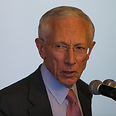
'Israelis should ask themselves how they lost Stanley Fischer to America'
צילום: אוהד צויגנברג
Their gain, our loss
Op-ed: Proposal to appoint Stanley Fischer as Fed vice chair should make us both proud and sad
If former Bank of Israel Governor Stanley Fischer is indeed appointed vice chairman of the US Federal Reserve – and this appointment faces many obstacles, from Fischer's agreement to the its approval by the Congress, including solving the problems of his dual citizenship and age – we will all be able to feel justifiably proud. And justifiably sad.
Prof. Fischer ate a lot of dirt here. In his first term as governor, he worked day and night to reconcile between an aggressive workers' committee and an as aggressive Finance Ministry. In his second term, he was forced repeatedly to explain his moves to save the economy, including the massive purchase of foreign currency and the sharp reduction in the interest rate, especially in the months before he stepped down.
Without a shred of justice, Prof. Fischer was accused of causing huge losses to the economy because of the dollar purchases, of being responsible for the hiking apartment prices because of the low interest rate, of accepting the banks' high commissions (which are actually low) because he favored the stability of the financial sector over the consumer, etc.
When Prof. Fischer announced his plan to step down, there were those who embraced his deliberations with unconcealed joy – and urged him to resign.
When the Bank of Israel wanted to hold a major international conference marking Fischer's departure, it was criticized for the "bombastic cost" of the planned event. The Bank of Israel settled therefore for a small symposium, and the full symposium was held by the International Monetary Fund (IMF) in Washington and was, undoubtedly, the most important economic event in recent years. If it wasn't for different Israelis' envy, it could have been held in Jerusalem.
Prof. Fischer was surrounded by the love of the citizens of Israel. He saw himself as an ardent Zionist and patriot. Upon leaving the governorship, Fischer waited for an appeal from academic institutions in Israel or from heads of the non-private sector, but to no avail. No one (almost, there were a few exceptions) turned to him and asked him to lead a local institution.
At the same time, the voices of admiration in the world grew over his policy as Bank of Israel governor, his wisdom as an economist and his professional achievements. If it were not for his Israeliness – rather than his age – Prof. Fischer would have been serving today as the managing director of the IMF.
Prof. Stanley Fischer was convinced that there would be no dispute over his replacement, after he publicly chose Dr. Karnit Flug, the deputy governor, to succeed him as governor. But someone was annoyed by Fischer's selection and did everything so that Dr. Flug would not be appointed governor – until he was left with no other choice. The affair angered and upset Prof. Fischer.
The proposal to appoint Prof. Fischer as the deputy of Janet Yellen, who has been nominated chair of the Federal Reserve, is a brilliant idea raised by President Obama and his advisors. The current Federal Reserve chairman, Ben Shalom Bernanke, is one of Fischer's students, as is the president of the European Central Bank. In addition to his professionalism and experience, Fischer will contribute to the Federal Reserve his wonderful intelligence as well.
But, as I said, our joy is mixed with sadness. Sadness over the fact that Prof. Stanley Fischer is going back to America, after immigrating to Israel in 2005 in order to settle down here for good. He won't be able to do that as vice chairman of the Federal Reserve. We should engage in self-examination and ask ourselves how this happened. How we lost Fischer to America.










